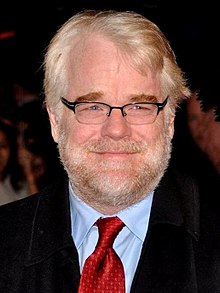Philip Seymour Hoffman
| Philip Seymour Hoffman | |
|---|---|

Hoffman at the Paris premiere of
The Ides of March in October 2011 |
|
| Born |
Philip Hoffman July 23, 1967 Fairport, New York, U.S. |
| Died | February 2, 2014 (aged 46) Manhattan, New York, U.S. |
| Cause of death | Acute mixed drug intoxication |
| Resting place | St. Ignatius Loyola, New York, U.S |
| Alma mater | Tisch School of the Arts |
| Occupation | Actor, producer, director |
| Years active | 1991–2014 |
| Partner(s) | Mimi O'Donnell (1999–2013) |
| Children | 3 |
| Relatives | Gordy Hoffman (brother) |
| Awards | List of awards and nominations |
Philip Seymour Hoffman (July 23, 1967 – February 2, 2014) was an American actor, director, and producer of film and theater. Best known for his distinctive supporting and character roles – typically lowlifes, bullies, and misfits – Hoffman was a regular presence in films from the early 1990s until his death at age 46.
Drawn to theater as a teenager, Hoffman studied acting at New York University's Tisch School of the Arts. He began his screen career in a 1991 episode of Law & Order and started to appear in films in 1992. He gained recognition for his supporting work, notably in Boogie Nights (1997), Happiness (1998), Patch Adams (1998), The Big Lebowski (1998), Magnolia (1999), The Talented Mr. Ripley (1999), Almost Famous (2000), Punch-Drunk Love (2002) and Along Came Polly (2004). He began to occasionally play leading roles, and for his portrayal of the author Truman Capote in Capote (2005), won multiple accolades including the Academy Award for Best Actor. Hoffman's profile continued to grow, and he received three more Oscar nominations for his supporting work as a brutally frank CIA officer in Charlie Wilson's War (2007), a priest accused of pedophilia in Doubt (2008), and the charismatic leader of a Scientology-type movement in The Master (2012).
...
Wikipedia
